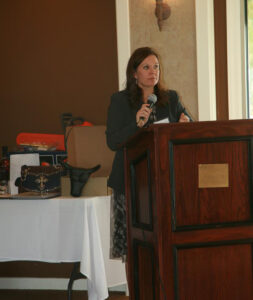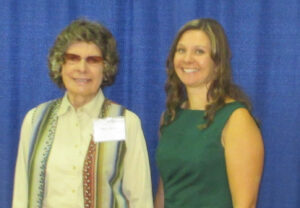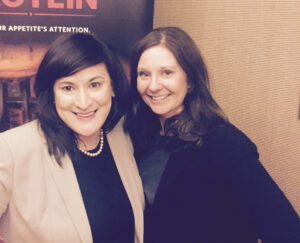Toni Meacham grew up understanding the importance of water for agriculture and from an early age wanted to advocate for those who depend on it. Working in her own law practice as well as with the Washington Agricultural Legal Foundation (WALF) has allowed her to do precisely that. Ms. Meacham’s experiences as both an attorney and a rancher enable her to understand the needs, interests, and viewpoints of a wide variety of stakeholders on water law issues. In this interview, Ms. Meacham tells Irrigation Leader about how she became interested in water and agricultural law, the unique challenges of those issues, and the importance of effective representation for farmers, ranchers, and irrigators in Washington State.
Irrigation Leader: Please tell us about your background and how you came to be in your current position.
Toni Meacham: I am a fifth-generation rancher. My mom’s family moved to the Columbia basin when my mom was in school. My grandparents had a large cattle ranch on the other side of Connell. My grandpa wanted one grandchild to be a lawyer, one to be a veterinarian, one to be a banker, and one to be an accountant. I was the argumentative one and always took on challenges, so I took the lawyer route. One of the great things about my family is that we are involved in public affairs on the national and state levels. We saw water law challenges and issues with the Bureau of Reclamation and the Washington Department of Ecology (DOE) over water ownership, jurisdiction, and pollution coming down the pipe in real time. We knew the people involved in these issues, so it was something that we talked about getting involved in.
In fifth grade, I decided that I needed to pursue the goal of protecting agriculture as a whole. I took part in a program called Running Start that allowed me to go to college during high school, so I graduated from high school with an associate of arts degree from Columbia Basin College. From there, I went to Washington State University and got a bachelor’s in animal science and reproductive physiology, just in case I didn’t get into law school. I graduated from law school at age 23, began working at a general practice, and went back to working at the family ranch. I realized I didn’t want to practice family law or anything mundane and instead wanted to focus on agriculture. I opened my own practice and focused on a variety of issues, ranging from contract law to big water law matters. I also continue to work on the family ranch.
Irrigation Leader: Did you learn about water law in the classroom, or was it something you had to learn in the field?

Toni Meacham: A little bit of both. When I was growing up, a phenomenal woman named Mary Burke was a good friend of my family. She was a rancher and a water expert, though not an attorney, and would tell me about water law issues and send me articles about the Clean Water Act (CWA) to read as early as when I was in sixth grade. When I was in law school, it wasn’t possible to formally specialize in water law. When I graduated from law school, I first went to work for another attorney. After I started working in my own practice, I started working with the WALF, a group of industry leaders who work on issues affecting farmers and irrigators. I’ve always been interested in water law; it’s always been a passion. For me, it was an easy transition.
Irrigation Leader: How has your background in agriculture and as a rancher helped you in your work as an attorney?
Toni Meacham: It means that I actually understand the terms. When I’m going into court, I often have to explain to judges what an irrigation circle is. For example, I recently dealt with a purchase and sale agreement. The other attorney worried that the water rights were going to be split from the land being sold. However, I understood that the rights in question were not true water rights. They were rights to use water within the irrigated acres established by the local irrigation district. Those are things I inherently know because I grew up here. When you start getting
out into the world, you realize that a lot of people do not understand agriculture or water law.
Irrigation Leader: Who are your clients, and what are the major sorts of cases that you take on?
Toni Meacham: I primarily focus on state law issues. I do have some federal cases, but those are pretty limited in scope. Primarily, I work for people in ag—either farmers or ranchers. I represent and consult with some irrigation districts. I work primarily on the agricultural landowner or lessee side of things.
Right now, there’s a big push for people to either water bank or to sell the water rights they are not using. In Washington State, if a water user doesn’t use their water right for 5 or more successive years, the portion not used reverts to the state. I’m helping people understand what their rights are, what water claims are and how they differ from water rights, and what they actually own. I do have a couple of cases in federal court, including U.S. v. Riley, which is a case on the Snake River.
I also serve as the water and ecology chair for the Washington Cattlemen’s Association, serve on the DOE agriculture and water quality advisory committee for the Washington Cattlemen’s Association, and am the executive director of the WALF. I am also on the attorney advisory committee for the Western Resource Legal Center, which is a law school clerkship program at the Lewis and Clark Law School.
Irrigation Leader: What percentage of the cases you work on are directly related to water?
Toni Meacham: That’s a hard question to answer, because even if a case does not deal directly with water law, there are always going to be water law implications. For instance, the purchase and sale agreement I mentioned, in which the other side was concerned about splitting off the water rights, is not a case I would classify as a water case. However, you have to know enough about water law to be able to advise people and move that process forward. Water is as valuable as gold in the Columbia basin and in our half of Washington State. It’s probably at least a consideration in almost every case I have.
Irrigation Leader: What kinds of threats to their water rights do irrigators in eastern Washington face?
Toni Meacham: As technology advances, there are more considerations that come up. We still have jurisdictional issues.
Navigable water is federal water, and everything nonnavigable is state water. Washington water law through the DOE is more stringent than water law in most other states. There have been a couple of interesting cases over jurisdictional issues in which it’s hard to track where water originates and hence who it belongs to. There was a case in 1990 in which the Washington State Department of Fish and Wildlife challenged the Bureau of Reclamation over jurisdiction and lost. We still have questions about who owns water and what landowners and lessees can do with that water.
Another consideration is the first in time, first in use principle. If your irrigation right supersedes that of a user upstream and there is a shortage, you may have to require that person to stop use. As more and more people are required to meter, it becomes more important to put water rights to beneficial use. A landowner who doesn’t use their water loses their water. There are also questions related to how water is used. A water right for irrigation purposes cannot be used for industrial purposes without a change in use through the DOE. At the end of the day, water is a public resource, and there are rules and regulations that govern how it is treated.
Irrigation Leader: It sounds like these regulations and jurisdictional issues are not always clear even for a lawyer like yourself. Given this complexity, which sorts of regulations and laws does the average farmer or irrigation district manager need to be familiar with?

Toni Meacham: The CWA is one that environmentalists are using frequently as they move forward with their litigation. I see a lot of cases on a federal basis and in federal court related to water pollution, the CWA, and how the Endangered Species Act (ESA) is not being implemented under the CWA to protect ESA-listed species. I think it’s important for any landowner to have some understanding of the widely used, larger-scale regulations that can affect them, such as the CWA.
Irrigation Leader: Would you describe the legal issues related to water spreading?
Toni Meacham: Let’s say I own 500 acres and Reclamation has designated that 100 of those acres are in the proper classes to be irrigated. Irrigation water cannot be placed on the remaining 400 acres. As time goes on, someone may put in an irrigation circle that happens to irrigate some of those nonirrigable acres. That is a case of water spreading. With modern technology, it’s pretty easy to determine who is water spreading and who is not. That’s something that all irrigators need to be aware of. If they are, it’s a pretty easy fix to talk to an irrigation district and see if there is a solution—maybe entering into an excess water contract, shutting off an end gun, or making some other adjustment to their irrigation practices. That’s better than just waiting to get caught and then getting fined.
Irrigation Leader: What are the kinds of cases that the WALF asks you to take on on its behalf?
Toni Meacham: It has to be an overarching issue—it can’t be a case that benefits one individual. For instance, we’re very involved in the Overtime Exemption Act case. The Washington Supreme Court recently decided that farmers, specifically dairy farmers, are not exempt from paying overtime. Luckily, that holding has been limited to the dairy industry, but it’s a big issue in Washington State right now. The WALF has been involved with this case since the beginning. We’re also heavily involved with state water cases in which environmental entities are claiming that dairies are polluting groundwater. We not only monitor the cases, but we raise funds for the litigation piece, and we seek to have parties with standing either intervene or file amicus briefs to support the ag industry.
Irrigation Leader: How do the legal issues of irrigation districts differ from those of individual farmers or ranchers?
Toni Meacham: They’ve got a bigger scope, of course, because usually irrigation districts aren’t just one person. One of the biggest hurdles involved in representing irrigation districts is that you’ve got a large group of people whose opinions don’t always align. Some of the smaller irrigation districts that use state water follow the principle of first in time, first in right. For example, in a group that uses state water to irrigate, someone upstream may have a later right than someone downstream. Technically, if there’s not enough water, the person upstream should shut off their irrigation for the person downstream. Because of convoluted issues like that, it can be hard to represent irrigation districts. That’s why having a good board can make the difference between immense frustration and actually moving forward and making progress.
Irrigation Leader: By “a good board,” do you mean a board that knows the relevant laws and regulations or a board that is familiar with the history of the district’s water rights?
Toni Meacham: To some extent, both. You also need a board that’s made up of people with common sense. You don’t want individuals on a board who are there to benefit one group or one person.
Irrigation Leader: What advice do you have for aspiring water lawyers?
Toni Meacham: Mentorship is key. I’ve been blessed in my life with some wonderful mentors who absolutely know the law. Sometimes, the mentor can be someone who is encouraging you to pursue your goal, no matter the hurdles you face. Law school was not fun for me; it was not something I enjoyed. I’m a rancher at heart, and I wanted to be back on the ranch. I’m much happier now that I can practice law and be on the ranch. Sometimes, it just took that mentor saying, “You can do this; stay in law school; you can make it,” to help me find my center and make me keep going.
Irrigation Leader: What advice do you have for an irrigation district, a farmer, or a rancher who is looking for a lawyer to represent them on a water issue? What kind of skills should they look for?

Toni Meacham: They need a team, not just an attorney. Agricultural clients need people who understand the process. Let’s use water rights as an example. Yes, it’s important to have an attorney who understands water law, but it’s also important to have somebody who understands agronomy; how to prove first in time, first in right doctrine; and how to prove that you are making beneficial use of that water on that ground. Agricultural clients may also need to have an accountant involved who can help them establish how much money they’ve invested. This can demonstrate how they have actually used a water right. Having an attorney is great, but sometimes it takes more than an attorney to help solve these issues and fight these fights.
Irrigation Leader: Is there anything else you wanted to discuss that we haven’t touched on yet?
Toni Meacham: I appreciate that your magazine is out there. Especially in the legal field, the people who understand irrigation law, and specifically water rights, are few and far between. Having this magazine out there, which helps us understand these issues and can point us to people who can help remedy issues, is very important. I really appreciate the article you did on Larry Martin—he’s a really good water lawyer.

Toni Meacham is an attorney based in Connell, Washington, with a focus on agriculture and water law. She can be reached at (509) 488‑3289.
